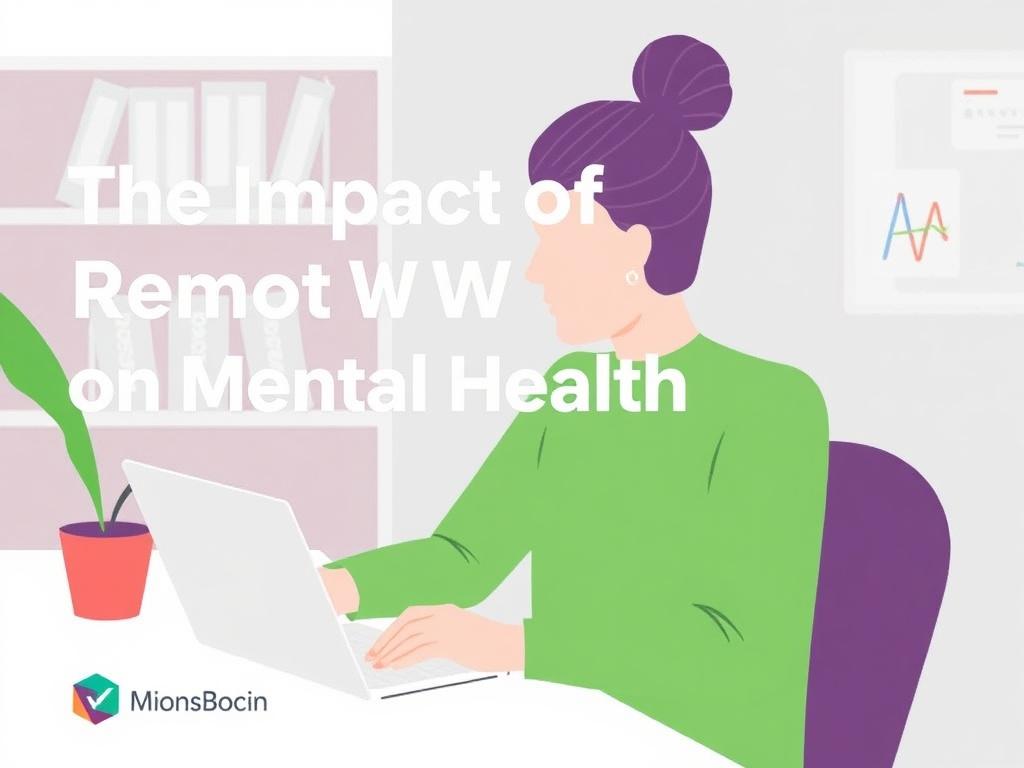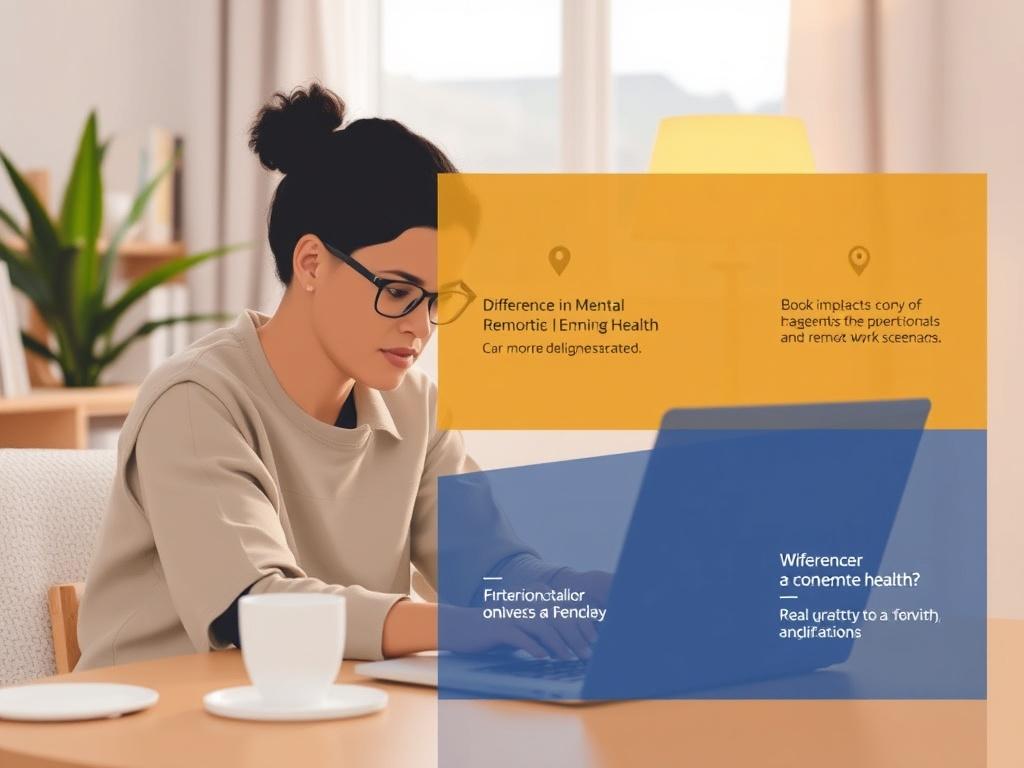Introduction: The Rise of Remote Work

Remote work has transformed from a niche perk to a mainstream mode of working in a matter of years. Fueled by advances in technology and, more recently, driven by the global pandemic, the way we work today is drastically different from even a decade ago. As more people find themselves trading commutes and office cubicles for home desks and kitchen tables, the question arises: what impact does this shift have on mental health? This article will explore the mental health challenges and benefits associated with remote work, how individuals and organizations are adapting, and what the future might hold.
Understanding Remote Work and Its Mental Health Implications
Remote work, or telecommuting, allows employees to perform their duties outside of a traditional office setting, often from home. While this flexibility offers numerous advantages such as better work-life balance and reduced commuting stress, it also comes with unique mental health challenges. The impact of remote work on mental health is a complex issue influenced by factors like social isolation, work-life boundaries, and access to support systems.
The isolation that often accompanies remote work can lead to feelings of loneliness and disconnection. Without casual water cooler conversations or face-to-face meetings, many remote workers experience a sense of social deprivation. On the flip side, the flexibility inherent in remote work can promote autonomy, reduce stress, and increase job satisfaction, all of which positively affect mental well-being.
Common Mental Health Challenges Faced by Remote Workers
Remote workers often encounter several specific mental health obstacles. Recognizing these challenges is the first step toward addressing them effectively.
- Social Isolation and Loneliness: The absence of daily interactions can leave employees feeling cut off from their colleagues and support networks.
- Blurred Work-Life Boundaries: Without clear separation between work and home, overworking or difficulty disconnecting after hours can increase stress and reduce relaxation time.
- Increased Anxiety and Stress: The uncertainty about job security, coupled with remote work challenges, can heighten anxiety levels.
- Feeling of Being Overlooked: Remote employees may worry they are less visible and thus less likely to receive recognition or career advancement.
- Technological Fatigue: Constant video calls and screen time can lead to burnout and decreased mental energy.
Each of these issues can contribute to a decline in mental well-being if not managed properly.
The Positive Mental Health Benefits of Remote Work
While the challenges are significant, remote work also presents opportunities for improved mental health that shouldn’t be overlooked.
- Flexibility and Autonomy: Remote work often allows people to set schedules that fit their personal rhythms and life commitments, leading to a better work-life balance.
- Reduced Commuting Stress: Eliminating daily travel can give back hours in the day, reducing fatigue and freeing up time for healthier activities.
- Ability to Create Comfortable Work Environments: Being able to design a personal workspace suited to individual needs can enhance comfort and productivity.
- Opportunity for More Family Time: Many remote workers find they can spend more time with loved ones, fostering stronger social bonds.
These positives can contribute to a more satisfying and less stressful work experience for many individuals.
Strategies to Support Mental Health While Working Remotely
Addressing the mental health impact of remote work requires both personal initiative and organizational support. Here are some effective strategies:
For Individuals:
- Establish Clear Boundaries: Set specific work hours and stick to them to prevent burnout.
- Create a Dedicated Workspace: Having a separate area for work helps mentally distinguish ‘work time’ from ‘personal time.’
- Maintain Social Connections: Regular virtual chats or even socially distanced meet-ups can combat isolation.
- Practice Self-care: Incorporate activities like exercise, mindfulness, or hobbies into daily routines.
- Seek Professional Help: When feelings of anxiety, loneliness, or depression become overwhelming, consulting mental health professionals is vital.
For Employers:
- Encourage Regular Check-ins: Managers should maintain frequent communication to ensure employees feel supported and connected.
- Promote Work-life Balance: Encourage employees to take breaks and respect their off-hours.
- Offer Mental Health Resources: Provide access to counseling, workshops, and stress management programs.
- Foster Team Building Activities: Organize virtual social events to maintain team cohesion.
- Adapt Performance Evaluations: Recognize the challenges of remote work and adjust expectations and feedback accordingly.
The Role of Technology in Mental Health and Remote Work
Technology is both an enabler and a challenge for mental health in remote work settings. On one hand, tools like video conferencing, instant messaging, and collaboration platforms keep people connected. On the other hand, the constant digital presence can lead to “Zoom fatigue,” information overload, and difficulty unplugging.
To mitigate these issues, it is helpful to adopt technology mindfully. Taking regular breaks from screens, setting meeting-free times, and using asynchronous communication can reduce the cognitive load. Additionally, apps focused on mental wellness, such as meditation guides or mood tracking tools, can support employees in managing their mental health proactively.
Differences in Mental Health Impact Across Various Remote Work Scenarios

Not all remote work experiences are the same, and mental health impact can vary widely depending on individual circumstances and job types.
| Remote Work Scenario | Mental Health Impact | Key Considerations |
|---|---|---|
| Full-time Remote Work | Potentially higher isolation; risks of burnout; greater autonomy | Importance of maintaining social interaction and clear boundaries |
| Hybrid Work (Mix of Remote and Office) | Balance between social connection and flexibility; possible adjustment challenges | Need for clear scheduling and communication protocols |
| Remote Work in Shared Living Spaces | Challenges with privacy and distractions; stress from multi-use spaces | Strategies for noise control and dedicated workspace are crucial |
| Remote Work for Caregivers/Parents | Increased stress balancing work and caregiving duties | Flexible scheduling and employer support are vital |
Understanding these varied experiences helps tailor support services and personal strategies that improve mental health outcomes.
How Remote Work Shapes the Future of Workplace Mental Health
As remote work becomes more entrenched, its mental health implications will continue to evolve. There is growing recognition that successful remote work arrangements depend heavily on mental well-being. This awareness is prompting organizations to integrate mental health support more strategically into work culture.
Future trends likely include greater emphasis on mental health technologies, expanded employee assistance programs, and more flexible work models that prioritize balance and autonomy. The ability to create inclusive and supportive digital work environments will be a defining factor for companies competing for top talent.
Summary of Tips for Maintaining Mental Health While Working Remotely
- Set and maintain clear work hours to protect personal time.
- Build and protect a dedicated workspace free from distractions.
- Stay socially connected through virtual or safe in-person interactions.
- Take regular breaks and prioritize physical activity.
- Employ mindfulness and relaxation techniques routinely.
- Don’t hesitate to seek professional support if needed.
- Use technology thoughtfully to avoid digital burnout.
- Communicate openly with employers about mental health needs.
Conclusion

The impact of remote work on mental health is a multifaceted reality that carries both significant benefits and challenges. While it offers unprecedented flexibility and can improve work-life balance, it also introduces risks like social isolation, blurred boundaries, and increased stress. Successfully navigating remote work’s mental health landscape requires awareness, intentional action, and supportive workplaces. As individuals and organizations adapt to this new normal, prioritizing mental well-being will be critical to sustaining productivity and overall happiness. By fostering connection, setting boundaries, and promoting accessible mental health resources, the remote work revolution can evolve into a sustainable and positive force for workers everywhere.




















